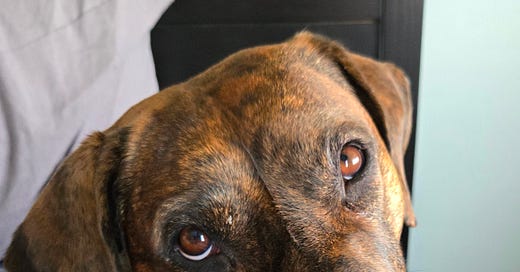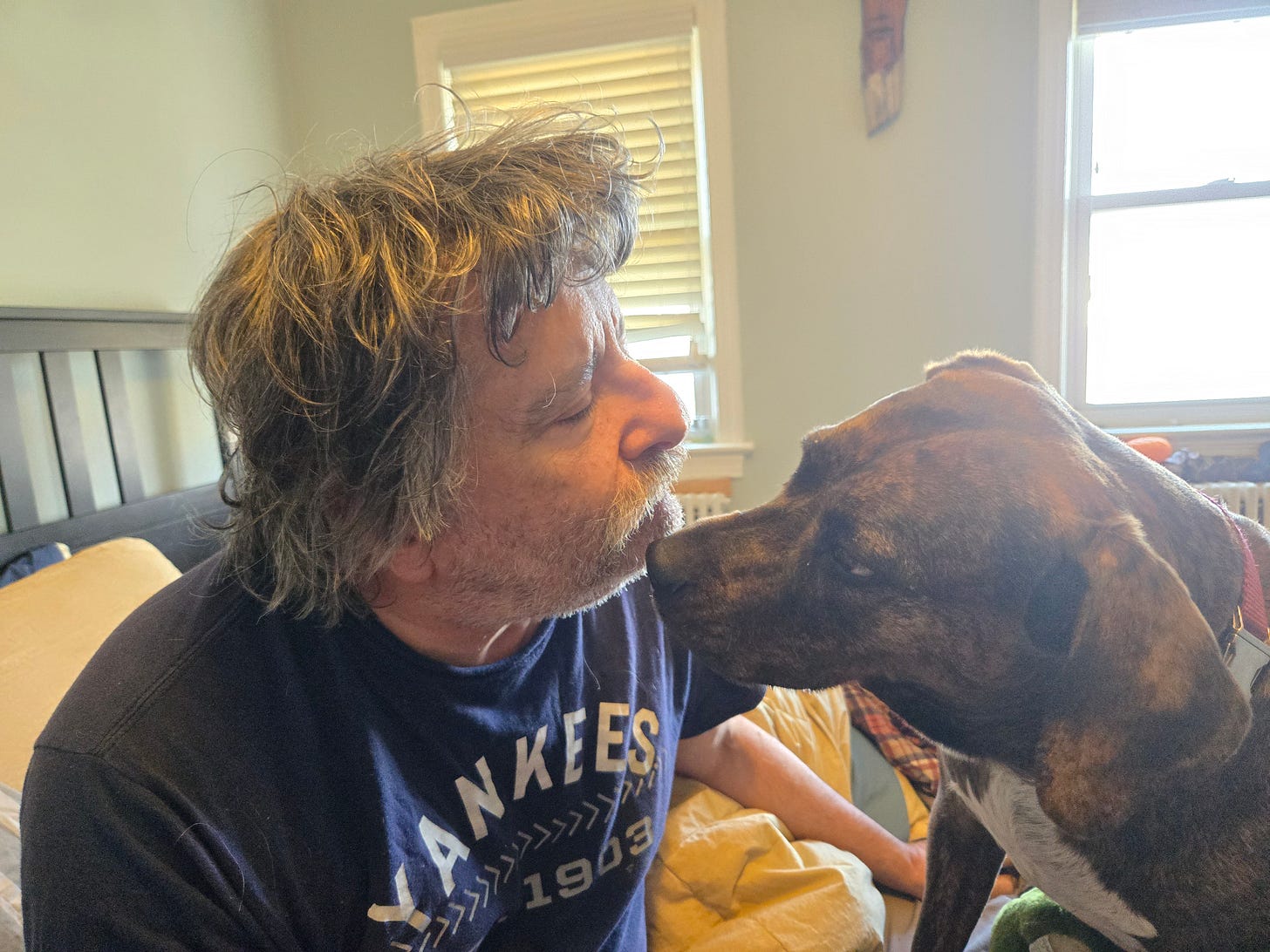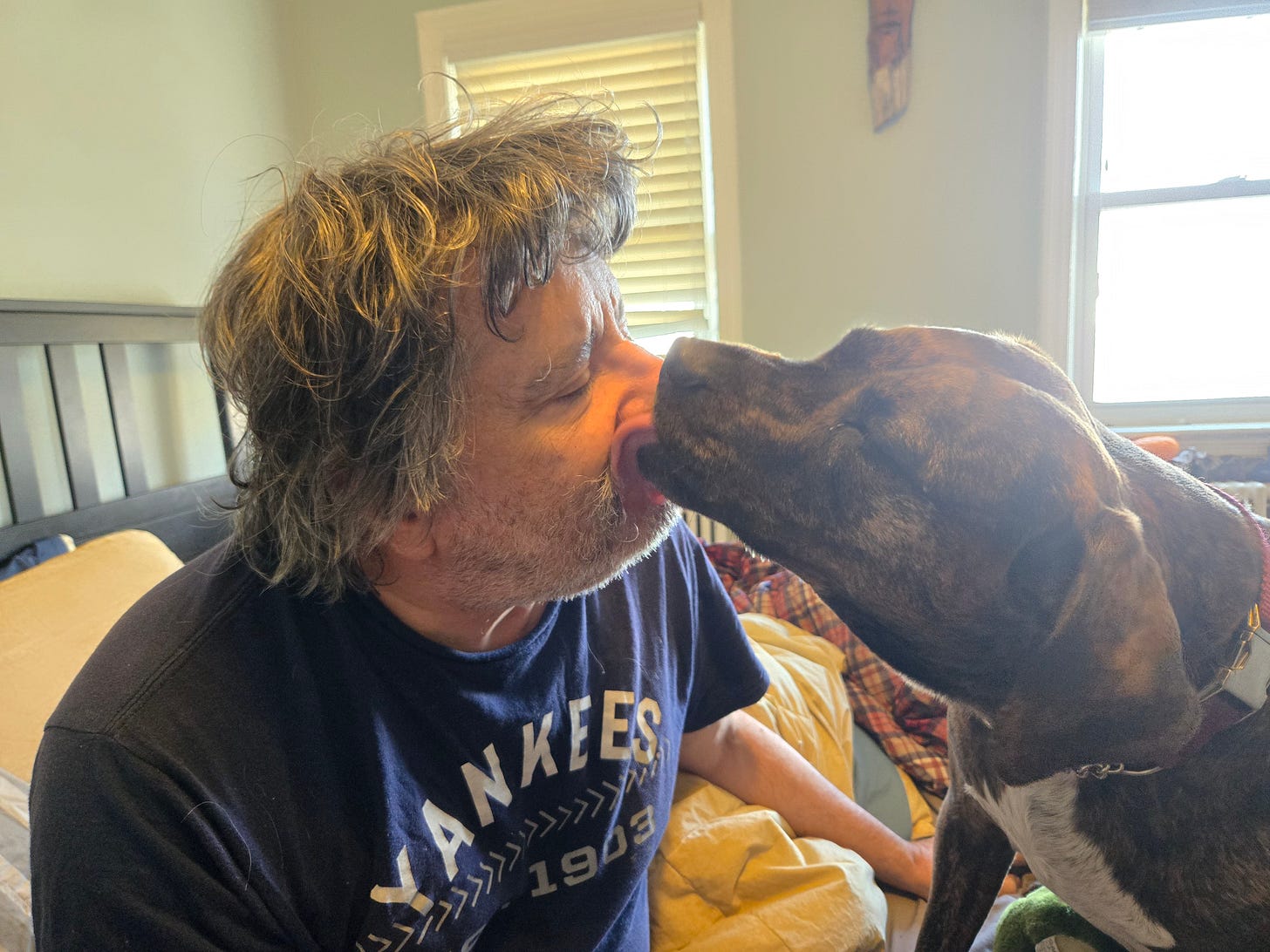Hello. This post is going to be particularly meaningful to those people who are aficionados of Severance, the imaginative, disturbing TV thriller that just completed its second year. It will also be meaningful to anyone who has, or has ever had, a job, and to everyone who despises Jeffrey Bezos, and everyone who loves, or has ever loved, a dog. The rest of you can safely skip it. I’ll understand.
Without giving anything important away, Severance is a sci-fi drama imagining a mega-company that has figured out a way to sever a person’s life at home from his or her life at work. He or she voluntarily undergoes a surgical procedure that places a chip in the brain that creates the following circumstance: When and only when they enter the offices of Lumon Industries, their brains shift gears from “person” to “worker.” These “innies” are suddenly without any memory of their “outie” —their real-world being — or of most of the realities in the outside world. They exist only as a worker in a huge corporation, which becomes their entire world, the only one they know. At work, they have strange, seemingly pointless professional jobs, the ultimate purpose of which they are told is important, but do not know.
The idea of all this is to create for the outies — whom the innies become after they leave the corporation every day, but with no memory of their work life — a happier existence that is free and unencumbered by work-stress worries. It is implied that future applications of this technology might be modified to include, say, sending your innie to experience detox for you, or childbirth, or a period of grief.
In fact, as the series shows, it creates an oppressive social stratification between the innie and his or her outie, who is the only one with the legal power to end this arrangement.
Got it? Good.
We just severed our dog, Lexi. Complexity ensued.
That’s Lexi, above. She is a terrific, loving, exuberant dog — mostly or all Plott Hound, a famously affectionate, infamously headstrong, breed. (Woven through this story here is the dramatic tale of how Rachel and I obtained Lexi. Just search for “Lexi.” Her story is in three short sections. This should be clear of the paywall.)
Anyway, three things recently collided concurrently to create the situation that that follows.
Due mostly to her attention-deprived first year, Lexi has some lingering behavioral problems, even at the age of four — particularly in showing aggression toward other large dogs. There are signs it is getting worse.
Rachel and I were leaving on a two-week international vacation, and, for reasons relating to Lexi’s behavioral problems, a extended-period dog-sitter was not an option.
In Chantilly, there is an excellent boarding facility that also offers intensive individualized behavioral training in a two-week course. (The place is named Dog’s Downtown, with the apostrophe.)
So that is where we left Lexi for the last two weeks. A new home, that presents a dramatically new setting, and dramatically new rules and customs. And, maybe, a wiped memory. Dogs very much live in the moment; they retain some things, of course —but maybe less so when plunged into new, radically different, overwhelming circumstances.
By night Lexi slept in one of the facility’s “larger” kennel areas, which was roughly four times the size of a crate. By day, she got hour-by-hour training in how to be a more obedient dog.
She was well taken care of, but not, well, loved. This was a business, very competently doing its job.
We had been told the training would involve mild shocks from an electric collar. We’d agreed to that. First, these were professionals — they clearly knew what they were doing. And second, we knew that Lexi’s escalating behavioral malfeasances might eventually have resulted in injury to another dog, or to a person, which might well have resulted in a death sentence for her. We signed, paid up front, and left for Cape Town and Istanbul, feeling hella guilty but persuaded this was for the best.
—
We picked her up just yesterday, the morning after we returned. Rachel and I were seated on a couch in a big room, and Lexi was brought in on a lead. She had her shock collar on. She started to pull toward us, tail wagging uncertainly. The trainer, a young woman named Sophia, softly said “no,” and pushed a button she held in her hand. Lexi stopped. “Come,” Sophia said, and Lexi backtracked. “Sit,” Sophia said, and Lexi sat. “Down,” Sophia said, and Lexi lay down.
“Good,” Sophia said. Each time Lexi did the right thing, Sophia gave her a small bit of hot dog.
This was impressive. Lexi had never shown a fraction of that sort of obedience. She’d known “sit,” period, and did not always obey even that. So, impressive. Also, as you can see, more than a bit disturbing.
“Okay,” Sophia said, brightly, and Lexi stood and began walking toward us. Sophia stayed put. When the dog ran out of slack in her leash and still kept trying to get to us, Sophia again said “no,” again, pressed the button, produced some hot dog, and the whole process was repeated.
In this manner, Lexi was allowed to traverse the ten or twelve feet from the door to us in small increments. It took two and a half excruciating minutes.
—
We took her home. She was clearly subdued, but excited to see the house. She explored it, top to bottom, as if for the first time. When we took her for her initial walk, she was happy to be in the city streets again, sniffing robustly, but docilely. Not broken in spirit, exactly, but clearly trained to a sort of reluctant civility she had never shown before. At Sophia’s instructions, we kept the shock collar on for this walk, and carried hot dogs, and deployed both of them as instructed. The collar shocks did not seem to hurt her — no yelping or flinching — but they delivered a reminder about who was boss. (At the training facility, we had each experienced the shocks, applied to our necks. It doesn’t “hurt,” but you notice it.)
Rachel and I remained troubled. We don’t want to be Lexi’s boss. She is our friend. We want her to be headstrong. It’s who she is.
—
She was okay through the day. Still Lexi, only more reserved. Not much tell-tail emotion. Oddly, she didn’t bark at the window as other dogs passed the house. She always had barked at the window as other dogs passed.
Still kind of jet-lagged, Rachel and I went to bed at 8:30, prepared to watch the last seasonal episode of Severance, where major mysteries would likely be resolved. At nighttime, Lexi always joins us in bed. She has always been welcome there — she sleeps with us — and overnight, in gradual pillow-seeking forays every time we go to pee, she always tries to hog the most space, and sometimes we let her. This time she did not even follow us upstairs.
We clicked “play.” Began watching. No sign of Lexi. Fifteen minutes elapsed. The characters on the screen are coming to terms with, or challenging, their subhuman status of enforced obedience.
“Did we forget to open the gate downstairs, so she can’t get up here?” Rachel asked, hopefully
“No,” I said.
I went downstairs. Lexi was lying on her ratty old bed in the living room, staring into space. She looked confused, maybe shellshocked. I invited her upstairs. She just blinked at me.
I went back up and called for her jauntily. No Lexi.
Fifteen minutes later, we heard her tick-tick-tick-tick. She was slowly ascending the wooden stairs. She entered the bedroom hesitantly. Looked around, sniffed around, circled the bad. We stayed silent, watching. She asked permission with her eyes. We stayed silent, watching. Then she leaped up, and was suddenly was all over us, weighing us down with her 75 pounds, tail whipping wildly, licking our faces into near asphyxiation.
Lexi’s outie was back.
—
I don’t know what to make of this, exactly, or what to expect. Today, Lexi was also great on the walks. She once started to harass another dog, was reprimanded, and stopped, which she’d never done before. She got a more than an occasional morsel of hot dog, and a less than occasional shock. Her exuberance is mostly back, and her affection is fully back, but she is, without question, a more obedient dog.
We do not know — nor do the writers and directors of Severance know — how the next season will play out. I’m thinking a balance of some sort will be reached. That shock collar will be put in mothballs as soon as possible. The hot dogs will remain a staple of our time outside. A sane and equitable middle ground will be achieved. Let the Severance writers take note.
Today’s Gene Pool Gene Polls: These are two things I’ve wanted to ask for years. They are only indirectly related to today’s post, inasmuch as they touch on the periphery of eugenics.
For question one, assume “blue eyes” covers blue, gray, and green, and such variations. Assume “brown eyes” covers brown and hazel, and such variations.
For question two, assume blond hair ranges from platinum to sandy. Assume dark hair ranges from black to brown.
That’s it for today.
Might you consider becoming a paid subscriber? We would appreciate it. It costs $5 a month, or $50 a year. And you’ll be able to comment and achieve historically cheesy fame by entering The Invitational.







I don’t even have a dog, but I am a retired behavioral specialist (human behavior). I really don’t want to be judgmental because you did what you felt you needed to do.
But aversive therapies are extremely problematic for a number of reasons. I think you are witnessing how such approaches can alter behavior in unexpected and unwanted ways. Keep the hot dog morsels, but trash the electric collar. And good luck. You’re already on the way to getting your Lexi back!
Luther Jett
Typed a long piece about Mary the dog, but Substack says it wants a title and I don't see anyplace to give it a title. Anyway she was a great loving docile German shepherd (for the most part), who'd failed obedience school but showed a side to her we'd never seen when 2 kids with guns approached us one night. Apparently she had this crazy protector side to her we didn't know. We're here because of her; Mary is long gone, still missed. Always her own person, loving to the end--and still missed and loved decades later. Just saw the chance with today's column to write about Mary.